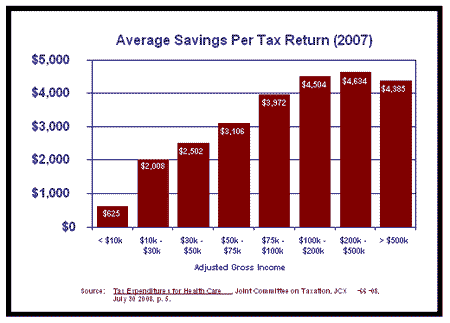
The Joint Committee on Taxation (JCT), Congress’ scorekeeping agency for tax legislation, issued a useful summary of the current law tax treatment of health insurance last month. JCT produced the summary in anticipation of a hearing called by the Senate Finance Committee on July 31st.
JCT estimates that the exclusion of employer-paid health insurance premiums reduced federal revenue by $246 billion in calendar year 2007. The revenue value of the exclusion from income taxes totaled $145 billion; the value in terms of payroll taxes not paid was $101 billion.
Among the more useful pieces of information in the summary was a distribution table showing the value of the tax exclusion across income categories, as shown in the chart. The data provided in the table confirms what many analysts have stated over the years, which is that today’s tax treatment of job-based health insurance is worth more to upper income taxpayers than lower income taxpayers. One of the reasons, of course, is upper income households pay higher marginal tax rates, so excluding premiums paid by their employers from their taxable income is worth more than it would be for a person paying a lesser rate of tax.

The full JCT report is available here.
